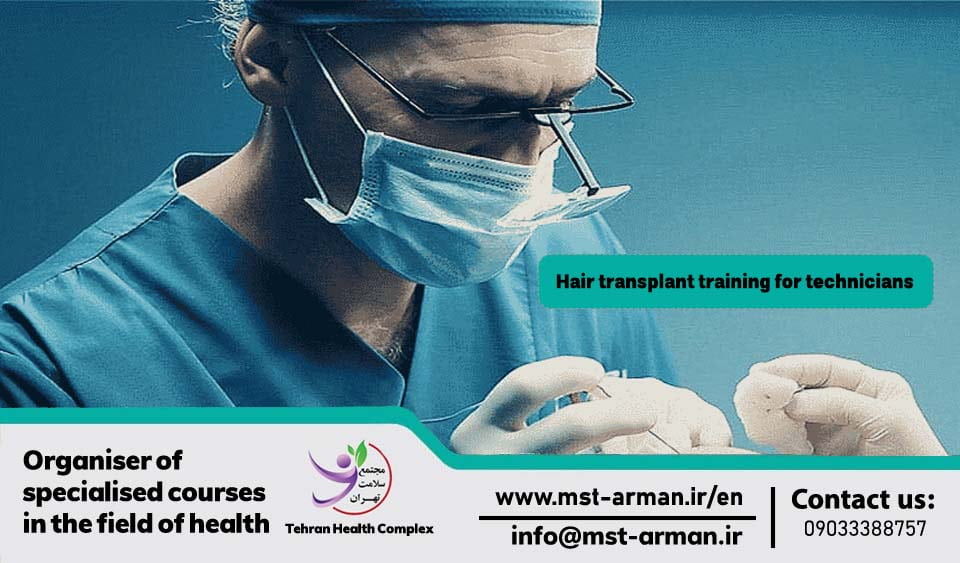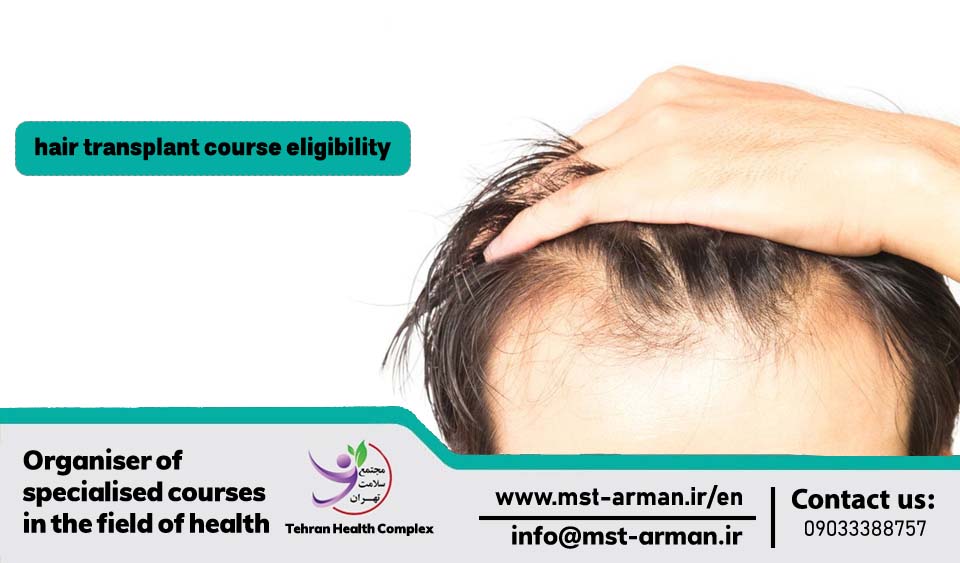You must have noticed that many people like doctors, technicians or even nurses are by your side during the hair transplant process. What is the role of each in the hair transplant process? Does everyone qualify for the hair transplant course eligibility
Your questions will be answered in today’s article. First of all, you should know that the structure of hair transplant centers is different from one another, but in this article we will specifically address the task of each of them.
Who is eligible to participate in the hair transplant course?
All people can be trained in hair transplantation, but people who have paramedical qualifications such as nursing, midwifery, operating room and anesthesia can start their own activities as hair transplant technicians after completing the course. But people who are not paramedics can start their own activities as assistants alongside hair transplant technicians after completing the course. So, in short, if you have a paramedical degree, you can work independently in clinics, and if you don’t have a paramedical degree, you should perform hair transplants as an assistant alongside the hair transplant technician.
Now, in your opinion, what is the role of each of these people in the hair transplant process?
doctors, nurses and technicians; What is their role in planting each one?
Medical staff perform different tasks at each stage of the hair transplant process, and these tasks differ from clinic to clinic. You are interested in the job of a hair transplant technician, so be sure to pay attention to that part more than the rest!
In this section, we are going to explain to you the task that each person has in the hair transplant process.
hair transplant training for doctors
The doctor is in charge of hair transplant. He is the one who examines you and determines which hair transplant method is right for you. The hair transplant training course for doctors is such that they participate in these courses to update their science and knowledge in this field. Of course, as we mentioned before, people who have a medical degree can easily participate in these courses.
hair transplant training for nurses
The doctor or nurse is always the one who is by your side for pre-operative consultation and planning. Nurses who specialize in hair transplantation often have a higher level of experience and expertise in the process of hair transplantation and can cooperate with the doctor at his discretion. Some nurses are also called technicians, but not all technicians are qualified to be nurses. This distinction is very important and at the same time can cause confusion.
A doctor or nurse will also review and perform aspects of hair transplantation that require making incisions in the scalp. This includes preparing the head for implanting grafts and creating channels. Post-operative counseling is very common for doctors, and it can be done by them, and nurses can also do this.
Hair transplant training for technicians

Hair transplant technicians
Technicians generally assist in the preparation and placement of hair transplants, aftercare, and any ancillary assistance required. However, you may have noticed above that the work done by a technician may take several hours while the work done by a doctor or nurse takes less than 1 hour. This means that the patient may not see the doctor or nurse much and communicate more with you, who will be the technician.
As a hair transplant technician, you do not need to worry about how the patient will react to you. Make sure they know enough about everything there before you go to the clinic. The point that may stress you a little is that the entire hair transplant process depends on the level of professionalism of the technician and you are the key point of any hair transplant surgery that is performed.
What are the duties of a hair transplant technician?
- First, a hair transplant technician must have a detailed examination of the head hair and the bald part of the client’s head. This examination includes checking the areas of hair loss, the number of hairs that can be used for implantation and the type of scalp. Based on this review, the technician can design a suitable hair transplant plan for each person. After the examination, the hair transplant technician can start his work.
After the technician has the task of harvesting the real hair and placing it in the places where they are loose. If the reference does not have real hair, you should use immune hair.
- After the technician has collected the real hair it is time to prepare the binar for implantation and surgery. . This process involves the use of various techniques such as the FUT method (tape harvesting technique) or the FUE method (Mechanized Unit Extraction). Each technique has its advantages and disadvantages, and the technician must choose the best method based on the needs and conditions of the customer.
- In the third stage, when the hair transplant was done, the technician has the duty to inform the patient about the care that he must take after the operation. It includes advice on washing your hair, using care products, and detailed instructions on daily routines. The technician should inform the client about this and help him to get better results from the hair transplant.
- And finally, the hair transplant technician must have the ability to answer the questions of clients and patients. He should have enough information about the advantages and disadvantages of hair transplantation, the timing and costs related to this process. Also, the technician must have the ability to communicate well with customers and make them feel comfortable and confident. In general, the hair transplant technician must have the necessary training and skills to perform this activity and be able to provide his clients with the desired results.
final word
Now that you have met the people who are hair transplant course eligibility and also the difference between them, it is time to introduce you to a famous clinic in Tehran that is conducting hair transplant courses for you dear ones. This center is known as Tehran’s health center. In this complex, you will receive hair transplant training with professional doctors and professors, and then after receiving a hair transplant certificate from Tehran Health Complex, you will be able to work in beauty and hair transplant clinics. If you are interested and want to participate in the hair transplant courses of Tehran Health Complex, please call 02188946682.
Frequently asked questions about eligibility for hair transplant course
- Who are eligible for the hair transplant period?
All people can be trained in hair transplantation, but people who have paramedical qualifications such as nursing, midwifery, operating room and anesthesia can start their own activities as hair transplant technicians after completing the course. - What are the duties of a hair transplant technician?
1. Examining the patient’s head and providing the necessary advice, 2. Harvesting hair from hairy areas for planting in sparse and bald areas, 3. Answering customer questions, 4. Informing clients about post-operative care. - What is the role of a nurse in the hair transplant process?
Nurses who specialize in hair transplantation often have a higher level of experience and expertise in the process of hair transplantation and can cooperate with the doctor at his discretion. Some nurses are also called technicians, but not all technicians are qualified to be nurses.


